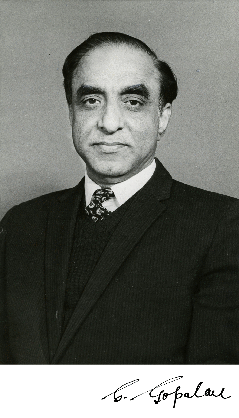Coluthur Gopalan facts for kids
Quick facts for kids
Coluthur Gopalan
|
|
|---|---|
 |
|
| Born | 29 November 1918 |
| Died | 3 October 2019 (aged 100) Kilpauk, Chennai, India
|
| Occupation | Nutritionist |
Coluthur Gopalan (born November 29, 1918 – died October 3, 2019) was a famous Indian nutritionist. He was a very important person in starting nutrition research in India after it became independent. His work led to many helpful programs, like the Integrated Child Development Services and the midday meal scheme for school children. He also helped create a program to prevent goiter, a health problem caused by not enough iodine.
He was so well-known that a condition called "burning feet syndrome" is sometimes called Grierson-Gopalan syndrome. He described this condition in 1946, especially among poor women in South India.
Early Life and Learning
Coluthur Gopalan was born in Salem, which was part of British India at the time. His father worked as a police officer. When he was ten, his family moved to Madras (now Chennai).
He went to M. C. C. Higher Secondary School and later studied at the Madras Medical College. He earned advanced degrees from the University of Madras and the University of London.
Dr. Gopalan began his career in nutrition research during the British rule. He worked at the Nutrition Research Laboratory for over sixty years. In the late 1950s, this lab moved to Hyderabad and became the National Institute of Nutrition. Dr. Gopalan became its director and greatly expanded its research.
Amazing Career
Dr. Gopalan's research made a huge difference in India. His work helped start the midday meal scheme that gives food to school children. He also helped create a program to prevent goiter, a health issue.
He started the National Nutrition Foundation. This foundation published an important book called Nutritive Value of Indian Foods. This book helps people understand what nutrients are in different Indian foods.
Dr. Gopalan received two of India's highest civilian awards: the Padma Shri and the Padma Bhushan. These awards are given for great service to the nation.
He set up many new departments at the National Institute of Nutrition. These included areas like studying diseases, how the body works, and food safety. He also created field units to do research in different places.
One of his big achievements was helping to start the National Nutrition Monitoring Bureau. This group studied health problems like malnutrition (not getting enough nutrients), Vitamin A deficiency, and other issues. Their work helped find ways to solve these problems.
Dr. Gopalan also became the director of the Indian Council of Medical Research. Here, he focused on diseases that were not getting enough attention. He also made the council more modern. He helped create three new research centers: the Malaria Research Institute, the Vector Control Research Institute, and the Leprosy Research Institute. These institutes work to prevent and manage these diseases.
His work on Indian foods was very important. He studied over 500 different Indian foods to find out their nutritional values. This detailed study helped India become the first developing country to have its own recommended daily allowances for nutrients. This means India had its own guidelines for how much of each nutrient people should eat every day.
Many people praised Dr. Gopalan's vision. R Hemalatha, director of the National Institute of Nutrition, said that the institute today shows his genius. She noted that his research formed the basis for major national nutrition programs started in the 1970s. Balram Bhargava, director-general of the Indian Council of Medical Research, called him a "visionary institution builder." He said Dr. Gopalan saw medical and nutrition science as connected and wanted to solve problems using many different approaches. He truly brought nutrition to the forefront of India's development plans.
 | Kyle Baker |
 | Joseph Yoakum |
 | Laura Wheeler Waring |
 | Henry Ossawa Tanner |

